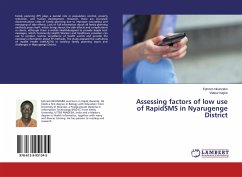
Assessing the Prevalence of Hepatitis B Virus Infection Among Patients
Hepatitis B Virus Infection
Versandkostenfrei!
Versandfertig in 6-10 Tagen
29,99 €
inkl. MwSt.

PAYBACK Punkte
15 °P sammeln!
Hepatitis B Virus (HBV) infection is a vaccine-preventable liver infection that can be transmitted through contact with the body excretes such as blood, saliva, sweat, urine, and fecal matter of an infected person. Around 250 million people are chronic carriers of the hepatitis B virus, and an estimated 700,000 people die from it worldwide each year. This infection is considered a major public health burden. Despite the development of a reliable HBV vaccination, chronic hepatitis B (CHB) and hepatocellular carcinoma (HCC) remain serious public health concerns globally. The General aim of the s...
Hepatitis B Virus (HBV) infection is a vaccine-preventable liver infection that can be transmitted through contact with the body excretes such as blood, saliva, sweat, urine, and fecal matter of an infected person. Around 250 million people are chronic carriers of the hepatitis B virus, and an estimated 700,000 people die from it worldwide each year. This infection is considered a major public health burden. Despite the development of a reliable HBV vaccination, chronic hepatitis B (CHB) and hepatocellular carcinoma (HCC) remain serious public health concerns globally. The General aim of the study was to assess the prevalence of hepatitis B virus infection among patients at Shuman Hospital. This study was a hospital-based cross-sectional retrospective assessment of patient records from the Shuman Hospital, shell branch in Sierra Leone western area from 2019 to 2021.The overall prevalence rate was similar to the >8% HBsAg prevalence rates reported in the past decade from other studies across West Africa and Asia.












